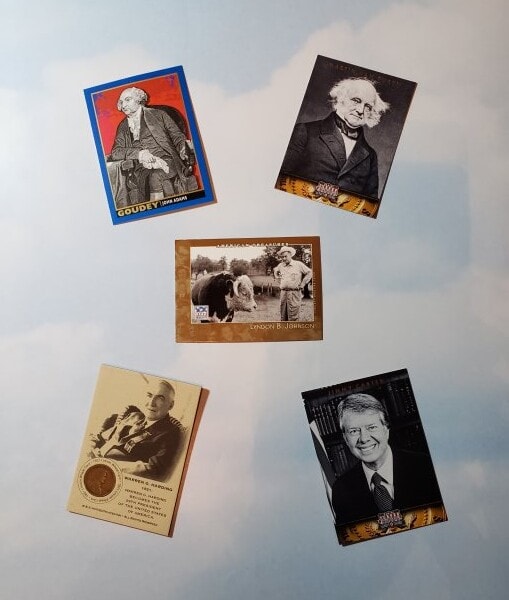Memories of the Snow
He stood out in the middle of the field. The snow covered the ground. He held the hand of his older brother and younger sister. His older brother, Tad, was thirteen years old. His sister, who was called May, was only seven years old. He was just nine years old. He was called Bertie.
The three children didn’t know what to think. The crowd around them was all in tears. They watched as the box was slowly lowered into the ground. They were now orphans. What would happen to them?
Although Bertie might not think so at this moment, he was lucky to even be there that day. On another snow covered day, when he was just two and a half years old, he was so close to death that the family put dimes in his eyes. This was a practice used when preparing a body for burial. One of his cousins rushed to find Bertie’s uncle, Dr. Henry John Minthorn. The doctor was out making house calls. When he was finally tracked down and came to the house, he quickly wrapped Bertie in a blanket. Next he pulled the child’s tongue from his throat and gave him mouth–to-mouth. It saved the child’s life and it wouldn’t be the last time this uncle would be there to help him.
Both of Bertie’s parents, Jessie and Hulda, were Quakers. His Dad, Jessie, was a blacksmith and farm implement dealer. When Bertie was six years old his Dad died suddenly. This left his widowed mother full of sorrow and she turned deeply toward her Quaker religion. The Quaker religion was experiencing a division at this time. She liked when music and a sermon were included in the services. The more conservative elements wanted things to stay the same without those two additions. Bertie’s mother so strongly favored the music and sermons that she would spend a lot of her time crusading for this cause. Dragging three little children behind her would slow down those efforts. So, while she went on those crusades, she would leave the children with family and friends.
Once, while his Mom was on one of her reform runs, she sent Bertie to one of their uncles, Major Laban Miles, who was an Indian agent to the Osage nation in Pawhuska, Oklahoma. Bertie and his three cousins would attend an Indian school. Already fond of hunting and fishing, Bertie learned even more about hunting, trapping and fishing from his new Indian friends. He became quite good with the bow and arrow and the fishing rod.
The three little fatherless children bounced back and forth between being with their mother and being with relatives and family friends. New adventures became memories of their childhood.
Most of us can look to our childhood and recall someone very near to us passing away. I remember great grandparents and grandparents passing away. But the end of childhood doesn’t bring an end to the sorrow or the fond memories we have of those who touched our lives so much. In fact, in a real sense, they are just an introduction into other moments in our adulthood when we will face trials and losses over and over again.
He is one of those Bible characters most of us have heard about before. His father, Jacob, married two sisters, Rachel and Leah. Since this was Biblical times, it was perfectly acceptable for his father to have two sisters for his wives. But his dad loved the younger sister, Rachel, so much more than the older sister, Leah. The problem was the younger sister, that he loved so much, was unable to bear him any children. In a somewhat unusual story, Rachel and Leah get into a prideful war on bearing children. Leah bore him four sons: Reuben, Simeon, Levi, and Judah. Upset and barren, Rachel lets Jacob sleep with her handmaiden, Bilhah. With Bilhah, Jacob has two sons: Dan and Naphtali. As if to one up Rachel, Leah lets Jacob sleep with her handmaiden, Zilpah. With Zilpah, Jacob would have two sons: Gad and Asher. Then, as if that weren’t enough, Leah produces two more sons, Issachar and Zebulun, for Jacob. Finally, Rachel becomes pregnant and gives Jacob two sons: Joseph and Benjamin. These end up being the Twelve Tribes of Israel. And we wonder why the Mideast is so messed up.
But Jacob still loves Rachel so much more than Leah. Jacob made it completely obvious that Rachel’s two sons, Joseph and Benjamin, were his absolute favorites. In fact, Rachel’s first son, Joseph, although he is Jacob’s eleventh child, was his pride and joy. Not only did Rachel, Leah, Bilhah, and Zilpah realize Jacob’s favoritism to this son, so did all the other brothers. Instead of trying to calm the flames of jealousy, Jacob seems only to pour gasoline on the fire. The only missing part from Jacob’s display of favoritism was the marching band. Jacob’s heart seems to break when shortly after Rachel gives him a second son, Benjamin. Rachel would die with the birth of Benjamin. Jacob’s heartache would translate into even more attention on Joseph. He would personally make Joseph an elaborate coat. Without a humble bone in his body, Joseph would pridefully parade his new coat in front of his brothers. Then Joseph would have dreams, which he was more than willing to share with his brothers. In these dreams he boasted how he would one day rule over them.
The brothers of Joseph were so upset with his taunting that they decided to kill him. One day when they were far from their father, Joseph came upon them. Several of the brothers thought this would be the perfect time to kill him. Other brothers weren’t so sure it was a good idea. They decided to gang up on him and throw him into a well until they could come to some sort of agreement as to what to do with the much disliked brother. All the while, Joseph is in the well yelling as loud as he can for someone to help him out of his situation.
It just so happened, about this time that a band of slave traders happened by. One of the brothers came up with the bright idea of selling the brother to the slave traders. After all, hadn’t he caused them all so much stress that they deserved some kind of compensation? “What will we tell Dad? You know he is his favorite,” was a question from one of the brothers. “I have an idea. We’ll tear the fancy coat, throw some animal blood on it, and we’ll tell Dad he was torn apart by a wild animal,” was the reply from another brother. They all agreed and, besides, they now had a little extra cash in their pockets.
So Joseph no longer had his father, whom he loved so much. He no longer had his mother whom had passed away. He no longer had his family. He was headed into the land of the great and scary unknown.
February 24, 1884 was the saddest day of all for Bertie. In the middle of the winter his mother contracted a fever. Transportation was hard to come by at the time and she was on one of her preaching circuits. She walked the three miles home which didn’t help the fever. At the age of thirty-six years old, she would suffer from Typhoid and her cold turned into pneumonia. All sorts of folk medicines were tried, but none did any good. She would die.
As Bertie, Tad, and May stood beside her grave, in the snow-covered field, family members would have to decide what to do with these three very young children. Tad would recall that time by saying, “The Lady of the golden sunshine…had gone away, and there were left only three small children, adrift on the wreck of their little world.”
They went to live with their grandmother temporarily, but she knew she was too old to care for them. Everyone wanted to keep the three of them together, but no one really had room for all three of them. It was decided to send them to separate homes. Their mother had the greatest desire that her children would be educated and the estate was divided three ways with most of the money going toward the three children’s education.
Bertie would go to live with his Aunt Millie and Uncle Allen. Bertie missed his Mom so much and found for many nights tears were the only method to help him fall asleep. Dr. Henry John Minthorn, the uncle who saved his life when he was two years old, had recently founded the Friends Pacific Academy in Newberg, Oregon. He wrote Aunt Millie and Uncle Allen that he thought it might be a great opportunity for Bertie if would come live with him and attend that school. Aunt Millie and Uncle Allen were quite fond of Bertie. They had lost their only son, Benjamin Bruce, and Bertie seemed to fill an empty void that their son left in his passing. With much grief in their hearts, they consented to the good Doctor’s request, because they knew it was the best thing for the child.
Our brother was now a slave and after a while he adjusted to and became quite good with his new role. But problems there, when the wife of his master accused him falsely of trying to take advantage of her, landed him in jail. There was now a new heartache sitting in the lap of his life.
Even in jail he would learn to grow into his new role. He rose to the highest position in the jail, where he was like a jailer’s assistant. He also uncovered the hidden talent of his youth, the ability to interpret dreams. It was this gift, and being able to use it with the Pharaoh’s dream, that eventually lead to his freedom. In addition, he also became an overseer of all Egypt during period when all that area went through a long lasting drought.
Bert, he would outgrow the name Bertie, would eventually enter the inaugural class at Stanford University and he would graduate with a degree in geology. As a mining engineer he would travel to remote places in the world, like Australia and China. Here he developed a process for extracting zinc. His expertise would make him quite respected and very rich.
During World War I, Bert organized a committee to get over 100,000 Americans home safely. They were trapped in Europe. Belgium was so impressed with his success with this effort that they asked him to organize an effort to feed their countless citizens that had been affected by the war. President Wilson then asked him to lead an effort to get America ready for the food efforts we would need once we entered War World I. Bert told President Wilson he would do it under two conditions. First, he could still help the Belgium people with their food drive. Second, he would not be paid.
Bert would motivate the nation to conserve and expand its food network. So successful were Herbert “Bert” Hoover’s efforts that the United States pledged 20 million bushels of wheat abroad, but we were able to send 141 million. In his book Wilson, A. Scott Berg writes, “In just one quarter of a year, the country restricted its consumption of sweets enough to send 500,000 tons of sugar abroad. In addition to beef, the nation increased its pork production by a million tons.” Berg continues, “Dumps nationwide noticed discernible decreases in garbage.”
Berg goes on to state, “…mothers withheld spoonfuls of sugar from their children’s cereal in his (Hoover’s) name; and the verb ‘Hooverize’ entered the lexicon – ‘to be sparing or economical.’” Through the trials and losses in his life, Hoover understood that tomorrow sometimes seems impossible unless someone takes you by the hand and leads you to it. He now wanted to be that person for others.
Joseph, our bragging boy with the amazing coat, would guide Egypt into one of the biggest food surpluses in history. He would be responsible for dividing out this food when the droughts came and no food was anywhere to be found. One day his brothers, without recognizing him, would come to him and beg for food. Instead of getting his revenge, Joseph helped save his people by offering them food. Joseph’s trials and losses taught him that our own efforts and attitudes go a long way in making life better for others. That more than likely translates into a better life for one’s self.
Prayer: Dear Mighty Father, Often in life, unfair things happen. Bitterness can be a result, but that usually leads to nothing but anger. Please hold my hand during those rough times and exterminate the weeds of bitterness before they have a chance to grow. Let my tough times be a light I can use to help others see when they walk through those dark times in their life. Amen.



